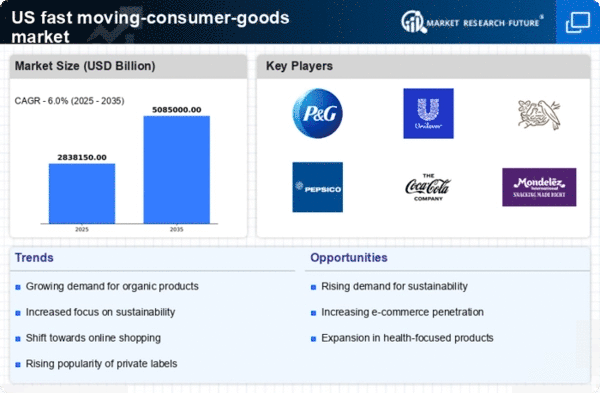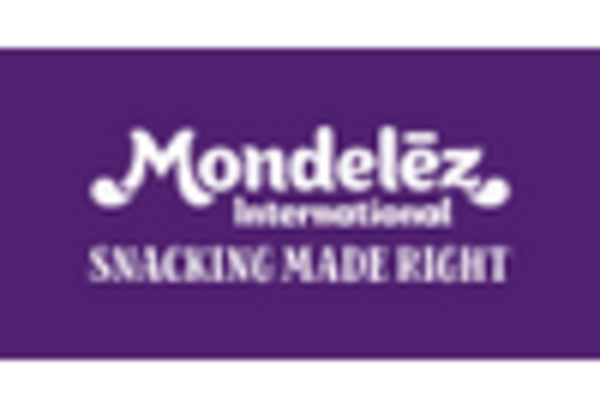Sustainability in Packaging
Sustainability in packaging is becoming a critical driver in the fast moving-consumer-goods market, as consumers increasingly prioritize eco-friendly options. The demand for sustainable packaging solutions is prompting companies to explore alternatives to traditional materials, such as biodegradable and recyclable options. In 2025, it is anticipated that the market for sustainable packaging will grow by approximately 12%, reflecting a shift towards environmentally responsible practices. This trend is not only driven by consumer preferences but also by regulatory pressures aimed at reducing plastic waste. Companies that invest in sustainable packaging are likely to enhance their brand image and appeal to environmentally conscious consumers. As the fast moving-consumer-goods market evolves, the emphasis on sustainability will play a pivotal role in shaping product development and marketing strategies.
Focus on Health and Wellness
The fast moving-consumer-goods market is increasingly focusing on health and wellness, as consumers become more health-conscious. This trend is evident in the growing demand for organic, natural, and functional products that promote well-being. In 2025, the market for health-oriented products is expected to grow by around 10%, driven by consumer awareness of the benefits of healthy eating. Additionally, the rise of dietary restrictions and preferences, such as gluten-free and vegan options, is prompting companies to innovate and diversify their product lines. This focus on health not only influences product development but also marketing strategies, as brands emphasize transparency and ingredient sourcing. As consumers prioritize their health, companies in the fast moving-consumer-goods market must adapt to these demands to remain relevant and competitive.
Evolving Consumer Preferences
The fast moving-consumer-goods market is currently experiencing a shift in consumer preferences, driven by a growing demand for convenience and quality. As lifestyles become increasingly hectic, consumers are gravitating towards products that offer ease of use and time-saving benefits. This trend is reflected in the rise of ready-to-eat meals and single-serve packaging, which have seen a notable increase in sales. In 2025, the market for convenience foods is projected to grow by approximately 8%, indicating a robust demand for products that align with modern consumer lifestyles. Additionally, the influence of social media and online reviews plays a crucial role in shaping purchasing decisions, as consumers seek validation and recommendations from their peers. This evolving landscape necessitates that companies in the fast moving-consumer-goods market adapt their offerings to meet these changing preferences.
Rising E-commerce Penetration
The fast moving-consumer-goods market is witnessing a surge in e-commerce penetration, which is transforming the way consumers shop. As online shopping becomes more prevalent, companies are increasingly investing in digital platforms to reach a broader audience. In 2025, e-commerce sales in the fast moving-consumer-goods sector are projected to account for approximately 30% of total sales, reflecting a significant shift in consumer behavior. This trend is driven by the convenience of online shopping, coupled with the growing availability of delivery services. Additionally, the rise of mobile commerce is facilitating on-the-go purchases, further enhancing the appeal of online shopping. Companies that effectively leverage e-commerce strategies are likely to gain a competitive edge in the fast moving-consumer-goods market, as they cater to the evolving preferences of tech-savvy consumers.
Technological Advancements in Supply Chain
Technological advancements are significantly impacting the fast moving-consumer-goods market, particularly in supply chain management. The integration of automation and data analytics is enhancing efficiency and reducing operational costs. For instance, the adoption of AI-driven inventory management systems allows companies to optimize stock levels and minimize waste, which is crucial in a market characterized by rapid product turnover. In 2025, it is estimated that companies utilizing advanced supply chain technologies could reduce costs by up to 15%, thereby improving profit margins. Furthermore, the implementation of blockchain technology is enhancing transparency and traceability, which are increasingly important to consumers. As these technologies continue to evolve, they are likely to reshape the operational landscape of the fast moving-consumer-goods market, enabling companies to respond more swiftly to consumer demands.
















